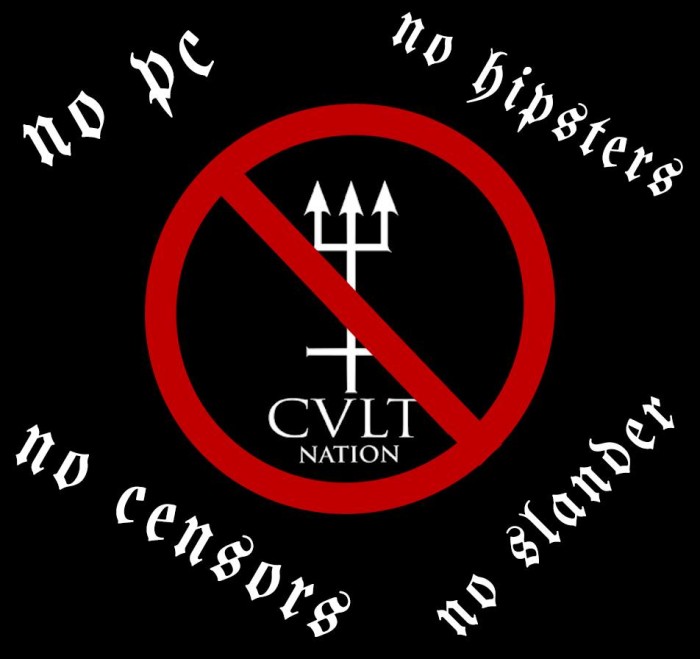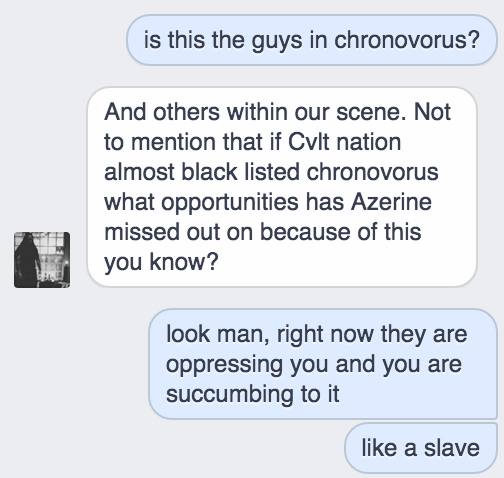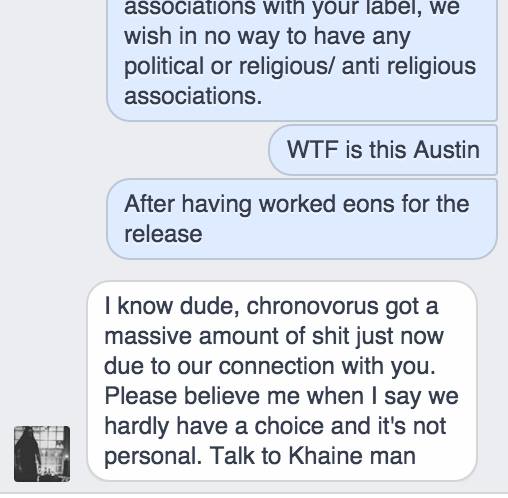Turkish record label Merdumgiriz — people who might actually face law enforcement consequences for their anti-Islamic expressions — found itself in the center of yet another controversy as band Azerine withdrew from the label after pressure by modern metal blog CvltNation.
Although only the least savvy of metal fans would go to some place named “Cult Nation” for their news, the blog has made a name for itself by covering war metal alongside the usual wash of hipster black metal and tryhard imitators. Merdumgiriz, on the other hand, is a small label which spends its time dodging Turkish religious authorities and authoritarian Western SJWs alike.
Merdumgiriz issued the following statement:
Yesterday I released the album of a so-called “extreme” metal band. I worked so hard on the released that I forgone one of my PornHub premium shemale sessions. Not to mention the money and hard work spent making merchandise. They are a band that uses Lovercraftian lyrics (the trigger on their brains must be malfunctioning for using that “racist” writer) and much “occult” symbolism. Today they wanted me to remove their entire name and work from my label like my label had Ebola saying “Pull all support for my band from any Merdumgiriz websites immediately. Members were not fully aware of the political associations with your label, we wish in no way to have any political or religious anti religious associations.”
Mind you, they share the stage and a member with Anti-Cosmic Satanist bands and frequently use upside down pentacles.
I have heard from good sources that the website CVLT NATION have told them not to work with my label. I apparently support National Socialist bands (which band is this?) anyway, this “Nazi” was kind enough to disregard the legally binding record contract those grown up men have signed with him and let them go. Not to protect their fragile feelings or PC image, but because I do not want to insult the name of “extreme art” with supporting pussies like this.
It is no secret that Viranesir uses racist and sexist terminology to open discussion and mock taboo subject matter. I think using overly offensive language will pull the strength out of taboo subjects and render them unusable for those in power.
Here are some lyrics for the VIRANESIR song HITLER RAPE:
I have lost all my sensitivity toward the taboo subjects in my life through art and I think it can be the same for everybody else. Of course, this will be a nightmare for those in power because they won’t be able to use those taboo subjects as a means of control anymore, hence they will do all within their power to not let words like “nigger, hitler, rape” lose their power. All you have to do is use them without fear. All you ever have to do is commit the greatest sin of freedom.
I am as shit as everybody else, but I seem to be the only one knowing, not fighting, even celebrating and all the while changing it…
You make fools out of yourselves doing extreme art and being pussies. You aren’t extreme, and you are not fooling anybody with screaming and playing loud. I am the real Satanist; I am LUCIFER the bringer of true black light. I change the false meaning of things into harsh truths and fight a lonely fight to break the tyranny of cosmic order, unlike pseudo-prophets singing safe songs about mythical phenomenon. Makes me vomit.
Emir Togrul
9.12.2015
While many of us are not fond of hearing some of the words in those lyrics, we realize that defending speech means defending unpopular speech, even Christian speech. And while this blog has no anti-Christian, anti-Islamic or anti-Semitic agenda, nor a racialist one, we understand that throughout human history demonized ideas have become the basis of the next era of society, and so we encourage open discussion of all topics. Viranesir, Merdumgiriz and Blighted take it further with pure provocation for the sake of pointing out how censored our society is, and for that reason as well we refuse to censor them.
Others feel differently. They have an agenda, but will not state what it is, preferring to work behind the scenes to sabotage the ability of others to express their point of view.
By threatening to “blacklist” metal bands for not conforming to its agenda, CvltNation creates the exact opposite of a safe space: a paranoid community where people fear accidentally saying or thinking the wrong thing as their careers will then be destroyed. This is the same method of control used in totalitarian systems like Soviet Russia and Nazi Germany.
A second band, Chronovorus, withdrew in fear of the blacklist as well. The fear spreads, and in the name… what? Fear of ideas? How metal is that?
8 CommentsTags: azerine, censorship, chronovorus, cultnation, cvltnation, merdumgiriz, metalgate


















